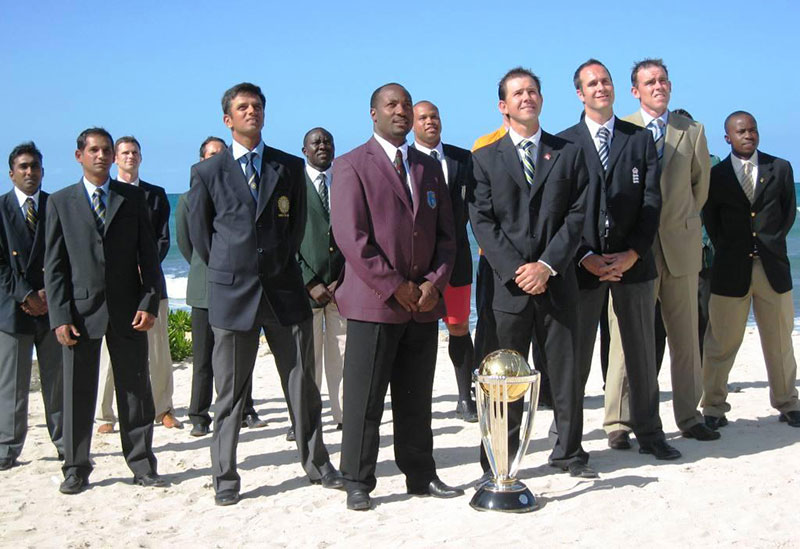Mar 16, 2007:
Unless cricket prospers in Africa it will soon resemble an antiquated game reserved for enthusiasts on two continents and hardy souls elsewhere. Australian mining companies have noticed that Africa’s potential remains untapped. Around the world immigrant communities from the continent are starting to escape from their ghettos to make their mark in sport. British athletics and French soccer count amongst those benefitting from mankind’s African outlet. Eventually Australian soccer, athletics and AFL will be strengthened by settler communities from Somalia, Sudan and elsewhere. It is just a matter of time.
Cricket cannot afford to lose is relevance in African sporting life. Happily the ICC has realised the need to promote the game on the vast continent or face the shrivelling consequences. Staging the World Cup in the Caribbean is part of the process. If successful, the event will invigorate the game in a region that has produced its finest writer, best cricketer and most noble character. A region that even now produced men of the calibre of Ian Bishop, Jeffrey Dujon and Tony Cosier. It will also help to inspire interest in Africa.

ICC Cricket World Cup 2007 team captains with the world cup trophy.
Photo: caribbeancricket / Ryan [CC BY 2.0 (https://creativecommons.org/licenses/by/2.0)], via Wikimedia Commons
A strong showing is needed from the West indies on and off the field. Hosting an event of this calibre is a responsibility and a challenge. South Africa’s opportunity came in 2003 but was spoilt by posturing Englishmen and timid Kiwis. Although excellently organised, the tournament was a flop. Indeed it was almost as bad as England’s lame effort in 1999, and Australia’s poor performance in 1991. The best competitions were those staged in England in 1975 and India in 1983.
As far as these matters are concerned, the report reads “so far so good.” Naturally journos relish the opportunity to mention every missing bag and evacuated hotel, but from a distance it appears that the tournament has a cheerful atmosphere. Moreover, the organisation seems to be going smoothly, a situation calculated to surprise the paternalists but not those aware that the West Indians had the sense to put arrangements in the hands of the bloke who oversaw the Athens Olympic. The hosts are not responsible for the mismatches in the early rounds. Those eager to apportion blame ought to contact Sharad Pawar, the politician running Indian cricket. Might also be worth asking him when he is going to stop supporting the evil let loose in Zimbabwe.
Fortunately the West Indies also won its first match, defeating a Pakistan team steadily moving towards rural religiosity. For at least a decade the West Indies has been living in the past. The team has been all show and no substance. Respect has to be earned. Now the younger players are emerging as worthwhile characters and the older fellows are responding to their example. Hitherto Chris Gayle had been the most accurate gauge of the team’s wellbeing. Now he was able to fail with the bat and not bowl a single ball and still the side won comfortably. Ramnaresh Sarwan scored runs, Marlon Samuels confirmed his belated maturing, Dwayne Bravo jumped around all over the place and Jerome Taylor produced a penetrating opening spell.
By the same token, signs of improvement are needed from the African teams to show that the effort has been worthwhile, that the game can meet the challenge presented by soccer and athletics and is not merely an fading colonial recreation. Happily, Kenya started creditably. Steve Tikolo batted solidly to take his team to victory over Canada. it is not so long ago that South African leaders were talking trash about the black man’s inability to concentrate. As everyone knows, they also cannot play halfback or fly a plane. Tikolo is a skilful batsman and a proud competitor.
Zimbabwe should have beaten a spirited Irish side (that may be a tautology), but blew up in the home straight. Prosper Utseya’s side lacks experience. Senior players expect to be paid and don’t care to be threatened by office bearers. Still, the Zimbabweans showed plenty of heart and technique. Eventually the wicked will be called to account and then both nation and cricket will flourish. Rather than taking redundant potshots at the Aussies, Sunil Gavaskar, a senior figure at the ICC, ought to use his influence to tackle genuine infamy. Mugabe’s death is eagerly awaited. His shadows in Zimbabwe cricket, Peter Chingoka and Ozias Bvute, ought to be taken from the current luxury and locked up.
South Africa’s fortunes will be closely followed. Against most expectations South African sport is enjoying a strong run. Not so long ago a swift decline in rugby and a slower subsidence in cricket was widely predicated. Graeme Smith leads a lively side dependent upon the contributions of a capable old guard that can hear the clock ticking. Lately his team has been driven along by once scorned dark skinned players. South Africa and West Indies are serious contenders and the game may well wish that one of them prevails.